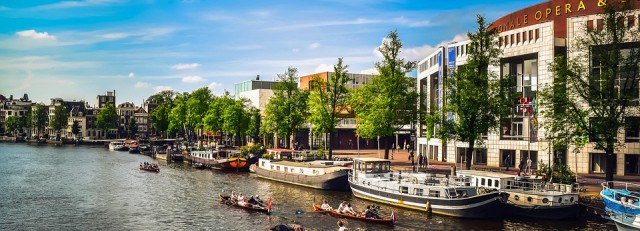
PERSBERICHT - Aankondiging excuses voor de Amsterdamse rol in de slavernij (2020)
“De stenen die jij op jouw pad laat liggen, daar struikelen je kinderen over”.
- Oud Surinaamse gezegde
Op 1 juli 2020 moet Amsterdam excuses aanbieden voor haar rol in het slavernijverleden. Dat vindt een ruime meerderheid van de Amsterdamse gemeenteraad. De Amsterdamse fracties van DENK, GroenLinks, BIJ1, ChristenUnie, PvdA, SP en D66 hebben daarvoor een initiatiefvoorstel ingediend om onderzoek te doen naar de rol van Amsterdam. Dit onderzoek moet dienen als eerste stap naar formele excuses en dient binnen een jaar te zijn afgerond, zodat op de symbolische datum van 1 juli 2020 op Keti Koti Amsterdam officieel haar formele excuses kan maken voor haar rol in het slavernijverleden.
Hoewel er in het Europese deel van Nederland officieel geen slavernij bestond, speelde het een cruciale rol in haar koloniën. Amsterdam speelde daarin een sleutelrol. De historie van slavernij is verstrengeld met onze gemeente. Zo was de gemeente Amsterdam lid van de “Sociëteit van Suriname” en daarmee voor 1/3 eigenaar van de kolonie Suriname. Van de rijkdom die het Amsterdam en haar bevolking opleverde, getuigt onder meer het geschenk van de bevolking van Amsterdam aan het koningshuis: de Gouden Koets. Naast de panelen van deze koets laat ook de Black Heritage Tour van Jennifer Tosh, verscheidene (zeer recente) publicaties c.q. wetenschappelijke onderzoeken zien hoe de koloniën én de daaraan verbonden slavernij zijn ingebed in onze stad Amsterdam. En welke rol Amsterdam daarin heeft gespeeld.
Meerdere overheden en instanties hebben al excuses aangeboden voor hún rol in het slavernijverleden; de Raad van Kerken (2013), meerdere Europese en Noord-Amerikaanse steden – zoals de stad Liverpool (1999) in Groot Brittannië en Charleston (2018) in Zuid-Carolina, het Capitool en Senaat van de Verenigde Staten – en steden c.q. landen uit nota bene Afrika. Het is tijd dat Amsterdam zich bij deze reeks aansluit.
Het wordt tijd dat we ons niet meer verbergen voor onze eigen geschiedenis, maar dat we verantwoordelijkheid dragen. Dat zijn we verplicht aan de toekomst van dit land en alle diverse groepen die hier in Nederland wonen. Door te praten over pijnlijke onderwerpen kunnen we groeien en wordt ons land écht volwassen. Daar heeft iedereen iets aan.
Het maken van excuses stelt een bepaalde moraal als norm voor de samenleving. Het erkent de gevoelens en situatie aan wie excuses worden aangeboden. De excuses en het eerherstel zijn noodzakelijk om een gezamenlijke toekomst te kunnen opbouwen, waarin een ieder gelijkwaardig is.
Het is tijd om de steen die te lang is blijven liggen, en waarover de Nederlandse gemeenschap al generaties lang over struikelt, weg te nemen.
De fracties van
DENK, GroenLinks, BIJ1, ChristenUnie, PvdA, SP en D66
ANNOUNCEMENT: Amsterdam to make apologies for its part in the history of slavery (2020)
“The rocks that you leave lying on your path, your children will stumble on”.
- Old Surinamese saying
On 1 July 2020 Amsterdam must apologize for her part in the history of slavery. An ample majority of the Council of Amsterdam supports this effort. The Amsterdam City Council sections of DENK, GroenLinks, BIJ1, ChristenUnie, PvdA, SP and D66 have submitted an initiative proposal to conduct a scientific research to what role Amsterdam played in the history of slavery. This investigation should be done within one year, as it is the foundation for formal apologies of Amsterdam on the symbolic date of the Dutch abolition of slavery called Keti Koti (Broken Chains): 1 July 2020.
Although officially slavery did not exist in the European part of the Netherlands, it was of crucial importance for her colonies. Amsterdam was a key figure in this. The history of slavery is intertwined with our municipality. For example, Amsterdam was a member of the “Society of Surinam” and with it 1/3 owner of the colony of Surinam. Of the riches it provided the city of Amsterdam and it’s inhabitants they have the Golden Carriage to show for: a gift of the people of Amsterdam for the king of the Netherlands. Besides this gift, there’s also the Black Heritage Tour by Jennifer Tosh, several (very recent) publications and scientific research that show how the colonies and the affiliated slavery are part of our city Amsterdam. And the part it played in it.
Several governments and organizations already apologized for their role in the history of slavery; the (Dutch) Council of Churches (2013), several European and North American cities – as the City of Liverpool (1999) in Great Britain, Charleston (2018) in South-Carolina (US), The Capitol and the Senate of the US – and even cities and countries from Africa.
It is time Amsterdam joins their ranks.
It is time we don’t hide ourselves from our own history, but come to terms with our responsibility. This we owe to the future of our country and to all the diverse groups living in the Netherlands. By talking about the painful subjects of our past, we grow as a nation and our country really matures. Everybody wins.
To apologize sets a certain moral as normative for society. It recognizes the feelings to whom we offer our apologies to. The apologies and rehabilitation are necessities to ensure to be able to build a joint future in which everyone is equal.
It is time to remove the stone that has been laying on our path for too long, on which Dutch society stumbled upon for generations.
The Amsterdam City Council sections of
DENK, GroenLinks, BIJ1, ChristenUnie, PvdA, SP and D66

